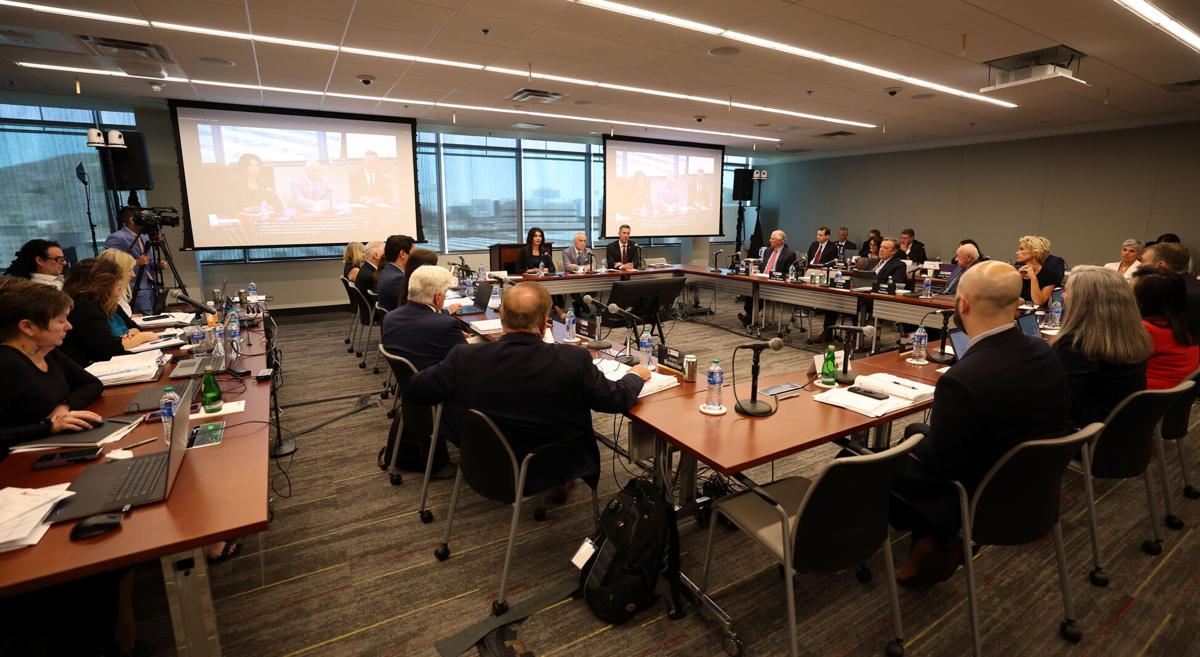The University of Arizona’s projected cash on hand for next fiscal year is 75 days short of the Arizona Board of Regents’ standard and about 100 days behind Arizona State University and Northern Arizona University.
The initial projection for next fiscal year, which UA’s interim Chief Financial Officer John Arnold told the board is conservative, is 67 days’ worth of cash on hand. ABOR policy requires a minimum of 140 days’ cash on hand at each of the state’s three public universities the board oversees.
ASU projects 163 days cash on hand while NAU expects 170 days cash on hand for next year.
“We’re hoping to outperform these assumptions, and we actually believe we will outperform these assumptions,” Arnold told the board at its meeting Thursday in Tempe.
UA’s projected number of days’ cash on hand is low because the university will be using more cash than usual to help operations during its financial deficit, UA spokesperson Mitch Zak told the Arizona Daily Star earlier this week.
The university started the year in a deficit of $177 million and decreased it to $162 million. Arnold and his team are projecting the deficit will shrink to $53 million by the end of next year.
Also in the university’s financial presentation Thursday, UA’s Chief Budget Officer Garth Perry said the financial action plan “incorporates no salary increase plan” for next fiscal year.
The university is investing money in “specific programs,” including those in nursing and a new business analytics program.

A passerby strolls near the Student Union Memorial Center on the campus of the University of Arizona.
“We expect fiscal (year 2025) to be the end of the decline and the path forward,” Perry told the regents. “We will begin to increase our reserves again” starting in fiscal year 2026.
Arnold told the board there are concerns about cuts to the Arizona Promise Program amid state budget debates in the Legislature. The Arizona Promise Program is a guaranteed scholarship program for eligible Arizona residents that ensures all tuition and fees are covered at the three public universities.
Regent Lyndel Manson expressed dismay at the possibility of the program seeing cuts.
“I’m disappointed that Promise is even a conversation on the chopping block,” she said. “Making it an unfunded mandate for the universities in beyond unfair.”
There was supposed to be a presentation about the UA Global Campus project, but it was announced during the meeting that the discussion would be postponed until later this month.
Terrorism policy
The board’s University Governance and Operations committee voted to move a new policy forward for full board approval that bars student groups from supporting “foreign terrorist organizations.”
“The proposed policy reiterates the board’s focus on protecting students,” said Thomas Adkins, ABOR’s vice president for government affairs and community relations.
Board policy would, if approved, prohibit student groups from “knowingly (providing) material support to a designated terrorist organization.” They could not call for violence and/or genocide against any individual group and “engage in or promote in person or in any other medium, including but not limited to social media, threats of genocide or harm against any student based on their race, color, national origin or shared ancestry.”
This comes on the heels of student-led pro-Palestinian encampments at all three state universities this spring.
New programs
The UA came to the board with a number of new program proposals, as well.
“We’ve held back many programs over the past few months as we’ve worked through our all-funds university budgeting process,” said Greg Heileman, the vice provost for undergraduate education. “Each of the programs that advanced went through extensive reviews based on their financial impact and sustainability, as well as how they fit into our overall academic catalog.”
The university presented proposals for a bachelor of science in real estate, a bachelor of arts in molecular and cellular biology, a bachelor of science in nursing in collaborative nursing education, a master of science and PhD in computer science and engineering, a master of arts in sport and recreation leadership, a bachelor of science in nutrition and dietetics, a bachelor of science in nutrition and wellness, and a bachelor of arts and science in justice and global security.
ABOR’s University Governance and Operations committee voted to send the proposals to the full board, though Regent Manson chose to abstain.
Get your morning recap of today's local news and read the full stories here: tucne.ws/morning
“I don’t want to be painting the walls and hanging the art and adding furniture to something that we are then going to remodel,” she explained. “As the UA wants to add programs, I hope that they will be incredibly conscious about adding things that are specifically in their areas of strength, not just adding programs that provide another major.”






